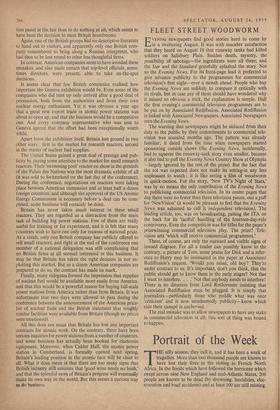FLEET STREET WOODWORM
VENING newspapers find good stories hard to come by Lin a sweltering August. It was with macabre satisfaction that they heard on August 18 that runaway tanks had killed soldiers on Salisbury Plain. Sudden death, mystery, the possibility of sabotage—the ingredients were all there; and the Star and the Standard gratefully splashed the story. Not so the Evening News. For its front-page lead it preferred to give advance publicity to the programmes for commercial television's first night—over a month ahead. People who buy the Evening News are unlikely to compare it critically with its rivals, but in case any of them should have wondered why it missed so obvious a trick, the explanation is simple. Half the first evening's commercial television programmes are to be put on by Associated Rediffusion. Associated Rediffusion is linked with Associated Newspapers. Associated Newspapers own the Evening News.
The warning that newspapers might be seduced from their duty to the public by their commitments to commercial tele- vision was sounded months ago. The pattern was already familiar; it dated from the time when newspapers started sponsoring outside shows (the Evening News, incidentally, had to squeeze the runaway-tank story even smaller, because it also had to puff the Evening News Country Show at Olympia —largely ignored by the rest of the press). But the fact that the rot was expected does not make its setting-in any less unpleasant to watch : it is like seeing a film of woodworm in quick-motion. For the story, 'New TV's Night of Stars,' was by no means the only contribution of the Evening News to publicising commercial television. In its centre pages that day there were no fewer than three television pieces, one a,puff for 'NewVision' (it would be pleasant to feel that the Evening News was ashamed to call it independent television). The leading article, too, was on broadcasting, patting the ITA on the back for its 'tactful' handling of the fourteen-day-rule controversy. Even the competition was for titles for the paper's prizewinning commercial television play. The prize? Tele- vision sets 'which will receive commercial programmes.'
These, of course, are only the outward and visible signs of inward disgrace. For all a reader can possibly know to the contrary, a picture of Tom, some praise for Dick and a refer- ence to Harry may be insinuated in the paper at Associated Rediffusion's request. 'Would you mind, old boy? They're under contract to us. It's important, don't you think, that the public should get to know them in the early stages? Not that I want to interfere. . . .' Not that anybody needs to interfere! There is no directive from Lord Rothermere insisting that Associated Rediffusion must be plugged. It is simply that journalists—particularly those who peddle what was once 'criticism' and is now unashamedly publicity—know which side their canapé is anchovied.
The real mistake was to allow newspapers to have any stake in commercial television at all; this sort of thing was bound to happen.


































 Previous page
Previous page